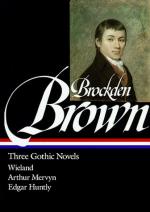|
This section contains 5,231 words (approx. 18 pages at 300 words per page) |

|
SOURCE: "Charles Brockden Brown and the Sublime," in The Personalist, Vol. XLV, No. 2, April, 1964, pp. 235-49.
In the essay that follows, Bernard argues that the praise Brown has received for his descriptions of the "American scene" is undeserved: the few occasions when Brown does discuss the American scene, he does so within the constraints of eighteenth-century aesthetics of the sublime and the picturesque.
Charles Brockden Brown (1771-1810) has often been praised for his description of the American scene in his novels.1 But, although Brown deserves much praise, it is by no means certain that he deserves it for his description of the American scene. It is surprising, first, how infrequently Brown describes the American scene at all. Second, when he does describe it, he does so almost invariably in terms of the eighteenth-century esthetics of the sublime and of the picturesque. Twentieth-century critics, perhaps eager to extend the...
|
This section contains 5,231 words (approx. 18 pages at 300 words per page) |

|


